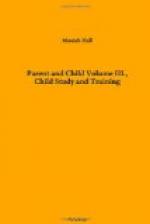When the little one is old enough to sit up in his high chair at the table, his conduct is not apt to be meek and good-mannered. He will snatch at things and tip them over, plunge his fists into the gravy, and fill his mouth with food, stuffing it in with both hands until he chokes. His mother is usually ashamed and grieved at his barbarous conduct; but she need not be, she should remember that good table manners are artificial, not natural, and that they are by no means a racial acquirement. She must resort, therefore, to necessary means to correct the child, even at times to physical punishment, though she herself must leave the room to shed a quiet tear over such seeming cruelty. Place the spoon in his hand and help the child to make the necessary movements and punish him slightly if need be whenever he departs too far from propriety, and it will be astonishing how quickly the conventional habit of table manners will be acquired. The kindest mother is the one who is brave enough to inflict some punishment when this is the surest way to develop needed habits that are unnatural to the child.
Soon the child learns to crawl; he does this because of the primal pleasure he has in bodily movements and because he has reached satisfaction in handling objects within his grasp; and since distant objects will not come to him, he must go to them, and this he does as soon as he is able. If objects would come to him whenever he desired, it is probable that he would not learn to crawl for a long time. Sometimes exceedingly awkward modes of crawling are acquired, which if noted and corrected when first attempted, would save much labor and pains afterward.
So long as crawling answers all demands and gives full satisfaction, it will be continued; but, usually because the child sees others walk, and possibly also because he himself has the instinctive desire to walk, crawling is no longer satisfactory. So he attempts to imitate the walking of his elders and through the aid and encouragement received from them, he accomplishes this marvelous feat—the greatest physical habit he will ever require.
LESSON XI
QUESTIONS FOR DISCUSSION
1. What are the first physical habits that the child should acquire?
2. What results from spasmodic training in these habits?
3. How should the crying reflex be treated?
4. How is selfishness early aroused? How can it be avoided?
5. Why should the young mother be heroic?
6. How may table manners, and other conventional habits be taught?
7. Why do the parents fail to implant right habits in their children?
The following will be found helpful for further studies on this subject: “The Care of the Baby,” by Holt; “The Care of the Child in Health,” by Oppenheim.




